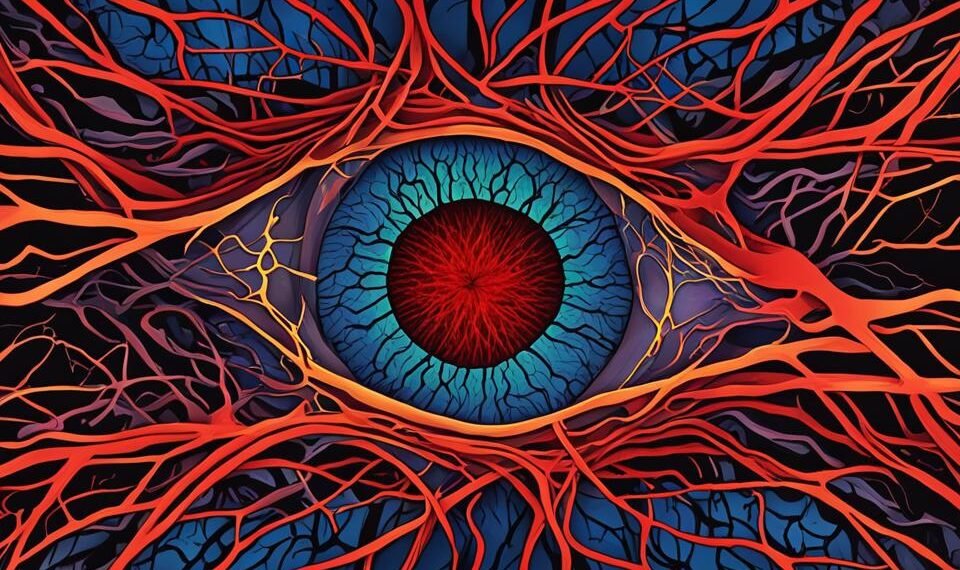In this section, we will delve into the significant topics of retina damage, diagnosis tests, and disease progression related to Beovu treatment. Whether you are currently undergoing treatment or considering Beovu for yourself or a loved one, we aim to provide you with the essential information you need. Please read the Disclaimer of this website.
Key Takeaways:
- Beovu (brolucizumab-dbll) is a medication used to treat wet age-related macular degeneration (AMD) and diabetic macular edema (DME).
- Beovu has been shown to effectively maintain vision in patients with wet AMD and improve vision in patients with DME.
- Diagnosis tests are crucial in determining the appropriate treatment plan for Beovu.
- Understanding the disease progression and the role of Beovu in managing it is essential for individuals with retinal conditions.
TOC
- 1 Retinal Health
- 2 Retinal Disorders
- 3 Retinal Examination
- 4 Neovascularization
- 5 Effectiveness of Beovu in Diabetic Macular Edema
- 6 Common Side Effects of Beovu
- 7 Serious Side Effects of Beovu
- 8 Beovu and Pregnancy/Breastfeeding
- 9 Other Medications and Retinal Damage
- 10 Medications That May Cause Retinal Damage and Vision Changes
- 11 Conclusion
- 12 FAQ
- 13 Source Links
Retinal Health
The health of your retina is important for clear vision. When the retina becomes damaged, it can cause vision problems.
There are several diagnostic tests that can be used to check the health of your retina. One common test is called an fundus exam. This test uses a special camera to take pictures of the back of your eye, including the retina.
Another common test is called an OCT scan. This test uses a special machine to take a detailed image of the retina.
If your retina is damaged, your doctor may recommend treatment with anti-VEGF therapy. This therapy uses injections of a medication to reduce the amount of VEGF in your eye. This can help to slow the progression of retinal damage and improve vision.
Retinal Disorders
Your retina is the layer of tissue at the back of your eye that senses light and sends images to your brain. It’s important for your vision, and when it’s not working properly, you may experience vision loss.
There are many different types of retinal disorders, and they can be caused by a variety of factors, including genetics, age, diabetes, high blood pressure, and more. Some common retinal disorders include age-related macular degeneration, diabetic retinopathy, and retinal detachment.
If you have a family history of retinal disorders or you’re experiencing symptoms like blurred vision, floaters, or vision loss, it’s important to see an ophthalmologist for a comprehensive eye examination. They can diagnose and treat retinal disorders and save your vision.
Retinal Examination
A comprehensive retinal examination is an important part of any complete eye examination. This type of examination provides your eye doctor with important information about the health of your retina, the innermost layer of your eye. During a comprehensive retinal examination, your doctor will conduct a thorough evaluation of your retina, including a visual acuity test, pupillary reaction test, external examination of your eyes, and a dilated fundus examination.
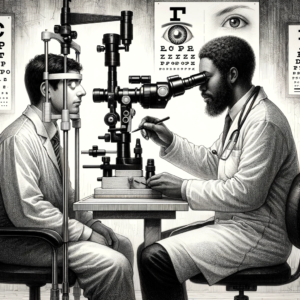
The visual acuity test is the first step in a comprehensive retinal examination. This test measures how clearly you see at various distances. To conduct this test, your doctor will ask you to read an eye chart from a distance of 20 feet. If you have trouble reading the eye chart, your doctor may ask you to repeat the test at a closer distance.
Next, your doctor will conduct a pupillary reaction test. This test assesses how your pupils respond to light. To conduct this test, your doctor will shine a light into each of your eyes and observe your pupil’s reaction.
After the pupillary reaction test, your doctor will conduct an external examination of your eyes. During this examination, your doctor will look for any obvious signs of injury or disease.
Finally, your doctor will conduct a dilated fundus examination. This examination provides a more detailed view of your retina. To conduct this examination, your doctor will place drops in each of your eyes to dilate, or enlarge, your pupils. Once your pupils are dilated, your doctor will use a special magnifying lens to examine your retina.
During a comprehensive retinal examination, your doctor is looking for any signs of disease or injury. Some common conditions that can be diagnosed during a retinal examination include macular degeneration, diabetic retinopathy, and glaucoma.
If you have any concerns about your ocular health, be sure to schedule a comprehensive retinal examination with your eye doctor.
Neovascularization
Neovascularization is a process whereby new blood vessels form from pre-existing vessels. This process is important in both normal tissue development and disease. In ophthalmology, neovascularization refers to the growth of new blood vessels in the eye.
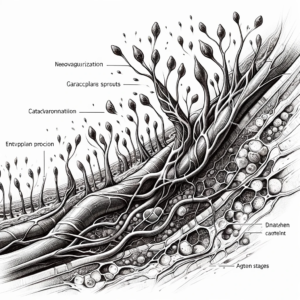
Neovascularization can occur in response to various stimuli, including hypoxia, inflammation, and growth factors. This process plays an important role in wound healing, as well as the development of certain diseases, such as cancer.
Neovascularization is a complex process that involves the migration and proliferation of endothelial cells, as well as the creation of a new extracellular matrix. This process is mediated by a variety of growth factors and cytokines.
The most important growth factor in neovascularization is angiogenic factor (AF). AF is a protein that is produced by various cells, including endothelial cells, macrophages, and cancer cells. AF promotes the growth of new blood vessels by stimulating the proliferation and migration of endothelial cells.
In ophthalmology, neovascularization refers to the growth of new blood vessels in the eye. This process can occur in response to various stimuli, including hypoxia, inflammation, and growth factors.
Neovascularization can lead to a number of problems, including retinal detachment, macular edema, and glaucoma. Treatment often involves intraocular injections of anti-VEGF agents, such as ranibizumab or bevacizumab.
Ophthalmology is a branch of medicine that deals with the diagnosis and treatment of eye disorders. Ophthalmologists are trained to provide comprehensive eye care, including the diagnosis and treatment of neovascularization.
Effectiveness of Beovu in Diabetic Macular Edema
Beovu, a powerful medication originally designed to treat wet age-related macular degeneration (AMD), has also shown remarkable effectiveness in treating diabetic macular edema (DME). DME refers to the swelling of the macula, a small but crucial part of the retina responsible for central vision. This condition often results in reduced vision and can significantly impact a person’s quality of life.
In two main studies, patients diagnosed with DME were treated with Beovu once every 6 weeks for the first five doses, followed by injections every 8 or 12 weeks. The results were promising, with both Beovu and aflibercept (a commonly used medication for DME) demonstrating significant vision improvement in patients.
| Treatment | Average Vision Improvement (Letters) |
|---|---|
| Beovu | 9.2 |
After one year of treatment, patients receiving Beovu experienced an average improvement of 9.2 letters on a standardized eye test compared to 10.5 letters in the aflibercept group. Although the difference in vision improvement appears minimal, it is essential to note that every letter on the test represents a tangible improvement in visual acuity.
Another study comparing Beovu and aflibercept demonstrated comparable results:
| Treatment | Average Vision Improvement (Letters) |
|---|---|
| Beovu | 10.6 |
These findings emphasize the effectiveness of Beovu in improving vision for individuals with diabetic macular edema. Treatment options like Beovu offer hope for patients struggling with DME and provide an opportunity for enhanced visual outcomes with proper medical guidance.
Remember, each case is unique, and it is crucial to consult with your healthcare provider to determine the most appropriate treatment plan for your specific situation.
Common Side Effects of Beovu
Beovu can sometimes cause side effects in patients. While not everyone experiences these side effects, it’s important to be aware of them. If you do experience any of these side effects, it’s best to contact your doctor for further guidance.
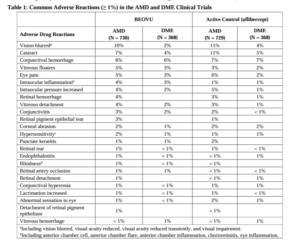
1. Blurred Vision
Blurred vision is a common side effect of Beovu. It may make it difficult to see clearly or focus properly. If you notice any changes in your vision while taking Beovu, it’s important to inform your healthcare provider immediately.
2. Cataract Development
Another potential side effect of Beovu is the development of cataracts. Cataracts can cause clouding of the lens in the eye, resulting in vision impairment. Regular eye check-ups can help monitor any changes in your vision.
3. Eye Bleeding
Some patients may experience bleeding in or around the eye as a side effect of Beovu. If you notice any blood in your eye or experience any unusual bleeding, seek medical attention right away.
4. Eye Pain
Eye pain is another side effect that can occur while using Beovu. This pain may be mild to severe and can interfere with your daily activities. If you experience persistent eye pain, consult with your doctor for appropriate management.
5. Floaters
Floaters are small specks or spots that appear in your field of vision. They may resemble tiny dark specks or cobweb-like shapes that float across your visual field. If you notice an increase in floaters while using Beovu, it’s important to discuss it with your healthcare provider.
6. Eye Swelling
Some patients may develop eye swelling as a side effect of Beovu. This can lead to discomfort and may also affect your vision. Promptly informing your doctor about any changes in eye swelling is essential for proper evaluation and management.
It’s crucial to note that these are common side effects of Beovu, and not everyone will experience them. If you have any concerns or questions about these side effects or any other symptoms you are experiencing, it’s always best to consult with your healthcare provider for personalized advice.
Serious Side Effects of Beovu
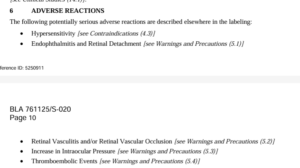
While Beovu (brolucizumab-dbll) can be effective in treating certain eye conditions, it is important to be aware of the potential serious side effects that may occur. These side effects, although rare, can have significant implications for your eye health. It is crucial to promptly report any symptoms or concerns to your healthcare provider.
Arterial Thromboembolic Events
One of the serious side effects associated with Beovu is arterial thromboembolic events. These are instances where blood clots form in the arteries, leading to reduced blood flow to vital organs. While uncommon, it is possible to experience a blood clot in the arteries, which can have serious consequences on your overall health.
Endophthalmitis
Endophthalmitis is a severe eye infection that can occur following intravitreal injections, including those of Beovu. This infection affects the tissues within the eye and can lead to vision loss if not promptly treated. It is important to monitor for any signs of infection after receiving Beovu and seek immediate medical attention if you experience symptoms such as severe eye pain, redness, or vision changes.
Retinal Detachment

Retinal detachment is a serious condition where the retina becomes separated from the underlying tissue. Beovu has been associated with an increased risk of retinal detachment, which requires immediate medical attention to prevent permanent damage to your vision. It is crucial to notify your doctor if you experience sudden flashes of light, floaters, or a curtain-like shadow obscuring your vision.
Retinal Vascular Occlusion
Another potential serious side effect of Beovu is retinal vascular occlusion. This occurs when the small veins carrying blood away from the retina become blocked, leading to reduced blood flow and potential vision loss. Recognizing the signs, such as sudden and painless vision loss, is vital in seeking immediate medical attention and potentially preventing further damage.
Retinal Vasculitis
Retinal vasculitis is inflammation of the blood vessel walls in the retina, which can impair blood flow and cause vision problems. Beovu has been associated with cases of retinal vasculitis, necessitating close monitoring for any signs of inflammation or vision changes. Reporting any unusual symptoms to your healthcare provider is crucial in managing this potential side effect.
It is important to remember that serious side effects from Beovu are rare, but they do warrant immediate medical attention. If you experience any concerning symptoms or have questions about the potential risks of Beovu, contact your healthcare provider for guidance and further evaluation.
Beovu and Pregnancy/Breastfeeding
When it comes to the use of Beovu during pregnancy or breastfeeding, important considerations must be made. While there is a lack of human studies on the subject, animal trials have shown potential risks to fetuses. It is crucial to weigh the potential benefits against the potential risks and make an informed decision with the guidance of a healthcare provider.
Pregnancy is a delicate time, and the effects of Beovu on the developing fetus are not fully understood. Therefore, the decision to use Beovu should be approached with caution. Close consultation with a healthcare provider is essential for pregnant individuals to ensure a comprehensive evaluation of the potential risks and benefits.
Breastfeeding is another critical consideration. Beovu may be present in breast milk, potentially affecting the nursing infant. The potential risks to the infant must be carefully evaluated, taking into account the potential benefits of Beovu treatment for the nursing parent.
Individuals who are pregnant or breastfeeding should actively engage in open and honest discussions with their healthcare providers. Together, they can assess the unique circumstances and determine the best course of action that prioritizes the health and well-being of both the parent and the child.
Risks and Considerations
While there is no conclusive data on the effects of Beovu on pregnancy and breastfeeding, there are potential risks that should be considered:
- The potential impact on fetal development due to the limited data available.
- The potential presence of Beovu in breast milk and its effects on the nursing infant.
Since every individual’s situation is different, it is crucial to consult with a healthcare provider to make an informed decision based on a thorough evaluation of the potential benefits and risks.
Other Medications and Retinal Damage
In addition to Beovu, it’s important to be aware that certain medications used to treat bladder conditions, such as Elmiron, have been associated with retinal damage and vision changes. Elmiron, also known as pentosan polysulfate sodium, is commonly prescribed for interstitial cystitis, a chronic bladder condition that causes pain and frequent urination.
The potential link between Elmiron and retinal damage was first discovered through a study conducted by the Emory Eye Center. It found that long-term use of Elmiron was associated with a type of retinal damage known as pigmentary maculopathy.
“The long-term use of Elmiron may lead to vision problems associated with pigmentary maculopathy, a condition characterized by retinal changes that can affect central vision. If you are taking Elmiron for your bladder condition, it is essential to be vigilant about your eye health and report any vision changes to your healthcare provider,”
Vision changes, such as difficulty reading or adapting to dim lighting, should not be ignored and may require immediate medical attention.
While the exact mechanism that leads to retinal damage is still unknown, it is crucial for individuals taking Elmiron or other medications to carefully review the medication guides and consult with their healthcare providers about the potential side effects. Regular eye exams and monitoring are essential in detecting any early signs of retinal damage and ensuring timely intervention to preserve vision.
It’s important to note that not everyone who takes Elmiron will develop retinal damage, and further research is needed to understand the risk factors and mechanisms involved. If you have any concerns or questions about the medications you are taking, it is always best to consult with a healthcare professional.
The Importance of Open Communication
When it comes to managing bladder conditions or any other medical condition, open communication between you and your healthcare provider is key. Be sure to share comprehensive information about all the medications you are taking to ensure a holistic approach to your healthcare and minimize the risk of potential complications.
Medications That May Cause Retinal Damage and Vision Changes
| Medication | Potential Side Effects |
|---|---|
| Beovu | Retinal damage, vision changes |
| Elmiron | Retinal damage, pigmentary maculopathy |
| Other medications used to treat bladder conditions | Retinal damage, vision changes (specific side effects may vary) |
Conclusion
In conclusion, Beovu (brolucizumab-dbll) has emerged as an effective treatment option for both wet age-related macular degeneration (AMD) and diabetic macular edema (DME). Patients with wet AMD have experienced maintained vision, while those with DME have seen significant improvements in their vision. The drug is administered through intravitreal injections, and the dosage varies based on the specific condition being treated.
It is important to note that Beovu is not without side effects. Common side effects include blurred vision, cataract development, eye bleeding, eye pain, floaters, and eye swelling. These side effects should be closely monitored, and any concerns should be promptly reported to a healthcare provider.
Furthermore, Beovu has been associated with serious side effects such as arterial thromboembolic events, endophthalmitis, immunogenicity, retinal detachment, retinal vascular occlusion, and retinal vasculitis. These risks highlight the need for careful consideration of the potential benefits and risks of using Beovu, in collaboration with a healthcare provider.
Individuals with retinal conditions, such as wet AMD or DME, should have thorough discussions with their healthcare team to fully understand the implications of using Beovu. By staying informed and aware, patients can make well-informed decisions that align with their individual needs and preferences.
FAQ
What is Beovu?
Beovu (brolucizumab-dbll) is a medication used to treat wet age-related macular degeneration (AMD) and diabetic macular edema (DME).
How does Beovu work?
Beovu is administered through intravitreal injections and works by inhibiting vascular endothelial growth factor (VEGF), which helps reduce abnormal blood vessel growth and leakage in the retina.
What is the recommended dosage for Beovu?
The recommended dosage of Beovu varies depending on the condition being treated and should be determined by a healthcare provider.
Is Beovu effective in wet AMD?
Yes, Beovu has been shown to be as effective as aflibercept in maintaining vision over a two-year period in patients with wet AMD.
Does Beovu improve vision in DME?
Yes, Beovu has been found to improve vision in patients with diabetic macular edema (DME) in clinical studies.
What are the common side effects of Beovu?
Common side effects of Beovu may include blurred vision, cataract development, eye bleeding, eye pain, floaters or small specks, and swelling of the eye or eyelid.
Are there any serious side effects associated with Beovu?
Yes, Beovu may cause serious side effects such as arterial thromboembolic events, endophthalmitis (a serious eye infection), immunogenicity (an immune response that can cause harmful reactions), retinal detachment, retinal vascular occlusion, and retinal vasculitis.
Are there any lawsuits related to Beovu?
Yes, there have been lawsuits filed against Novartis, the manufacturer of Beovu, claiming that the drug has caused vision loss and retinal damage. These lawsuits allege that Novartis failed to adequately warn about the potential risks of Beovu and its side effects.
Can Beovu be used during pregnancy or breastfeeding?
There is a lack of human studies regarding the use of Beovu in pregnant or breastfeeding women. The decision to use Beovu during pregnancy or breastfeeding should be based on a careful evaluation of the potential benefits and risks, with the guidance of a healthcare provider.
Has the safety label for Beovu been updated?
Yes, the safety label for Beovu has been updated to include new information about the risk of retinal vascular occlusion and retinal vasculitis. These conditions can potentially lead to eye damage and vision loss.
Can other medications cause retinal damage?
Yes, other medications, such as Elmiron used to treat bladder conditions, may also cause retinal damage and vision changes. It’s important to carefully review medication guides and consult with healthcare providers about the potential side effects of any prescribed medication.
